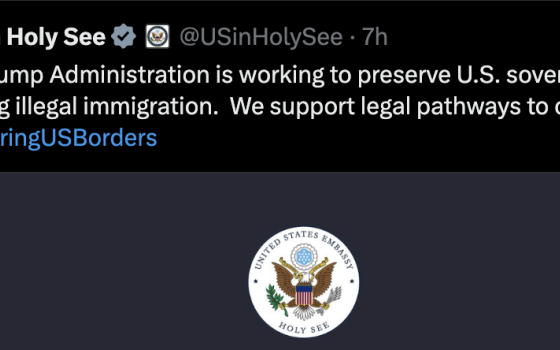WASHINGTON -- Deacon Bernard Nojadera, newly appointed to head the U.S. bishops' Secretariat of Child and Youth Protection, is a firm believer in working together.
"I don't work in isolation," he said, stressing the need for collaboration with church officials, diocesan leaders, agencies combating abuse and people the office is serving.
He intends to bring to his job, which starts Aug. 15, the same skills he has used as director of the Office for the Protection of Children and Vulnerable Adults in the Diocese of San Jose, Calif., since 2002.
"What I experienced here is being packed and coming along for the ride as part of the journey," he told Catholic News Service June 10 in a telephone interview from his San Jose office.
He plans to rely on his previous conversations with abuse victims, successful ways the diocesan office operated and a pattern of collaboration he developed with colleagues across the state.
He also comes to Washington with a sense of humility, saying he has "big shoes to fill" following predecessors Teresa Kettelkamp and Kathleen McChesney, who were both former law enforcement officers.
McChesney was the highest ranking female official in the FBI when she took the post with the bishops' child protection office in 2002, when it was created, and she served until 2005. Kettelkamp, who was the first woman to attain the rank of colonel in the Illinois State Police, has held the position since 2005 and leaves the job in August.
The office was established by the U.S. bishops' "Charter for the Protection of Children and Young People," which they approved in 2002, and it is responsible for helping apply the charter's mandates of abuse reporting and prevention.
"I hope to continue the good work they've started," said Deacon Nojadera, fully aware that he is the first man and the first clergyman to head the national secretariat. He doesn't see these firsts as having particular bearing on the role, though, and said he hopes people will simply look at his qualifications.
Ordained to the diaconate in 2008, Deacon Nojadera worked in parish ministry for several years after serving with the U.S. Marine Corps and the Army National Guard and as a commissioned officer with the U.S. Navy Reserves.
"I wasn't born with a religious title," said the father of a 20-year-old daughter and 16-year-old son who said he has "the same hopes and dreams for my children that any parent does."
His broader hope is to eventually see all abuse eradicated. The deacon said he does not downplay the responsibility of the church to address the abuse scandal but pointed out that the "reality of this evil is that it doesn't exist in the church alone but is systemic in society."
He thinks the church currently has a role to play as a "change agent so that abuse of any kind -- elder abuse, domestic violence and spousal abuse -- will not be tolerated" particularly as people become more aware of what to do to prevent abuse or how to report it when it happens.
He said he was often approached after giving talks in the San Jose Diocese by parents asking about Internet safety for their children or people saying they had been abused in relationships and wanting to know how to get help.
"We would be remiss to turn a blind eye to the rest of abuse," he said, stressing the need to educate people more on the issue and provide them with resources they need to report any kind of abuse.
To that end, Deacon Nojadera thinks the church is on the right track, saying the charter is a good start. He called it a "living document" that isn't perfect but is always able to be refined. He also credits the bishops with being open to dialogue and to keeping the issue of abuse prevention a top priority.
"The reality is that this is not an issue that is going to go away. This is part of who we are now," he said, stressing that every parish in the country needs to be fully accustomed to the fact that anyone who works with young people must be cleared to do so.
He said the bishops are setting the tone with this effort and the policies must continue to be followed as they become like "muscle memory"-- performed without conscious effort -- across the board.
When he began this ministry nearly a decade ago, one of the first things he did was attend a meeting of the Survivors' Network of those Abused by Priests, known as SNAP. He told the group he wanted to let them know of the diocesan office and find out how it could help them.
From that meeting, he said he "befriended survivor victims who were highly instrumental in helping me see the situation from their eyes" -- which he intends to keep in mind in his new role.
He knows there is much to do and he is aware that it could be overwhelming, but he plans to rely on friends and family members, humor, music and, above all, his faith, saying the work before him is "a mission of the Holy Spirit."


